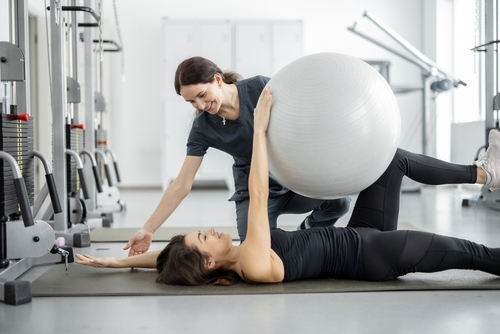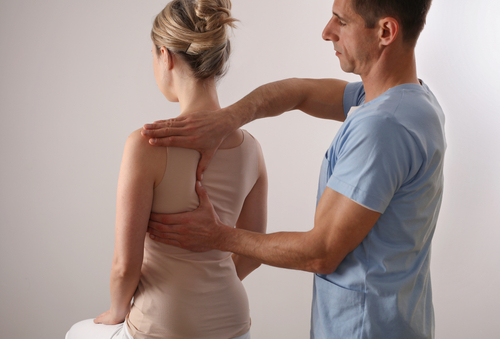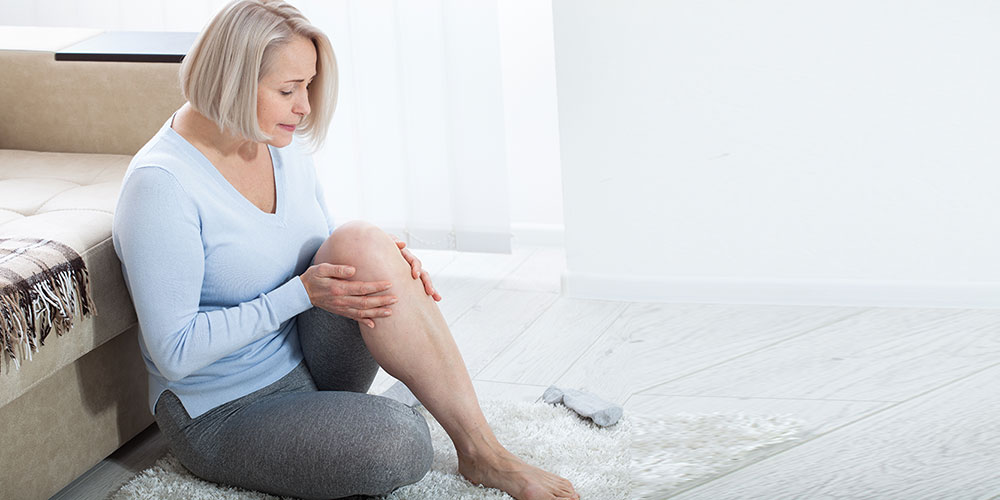Make an Appointment
As a local Women’s Health Physiotherapist, I see 3 common concerns in women during the third trimester of pregnancy: pelvic girdle pain, upper back & rib pain, and pelvic floor weakness (a.k.a. bladder leaking). I would like to share some tips and exercises to help you manage the pain and inconvenience.
1. Pelvic Girdle Pain
Many women experience pain in the front, back or side of the pelvis (pelvic girdle) in this stage. Pain is usually worse when walking, up stairs or crossing legs.
Tips for pelvic girdle pain:
- Try to keep legs moving together! So take smaller steps and reduce crossing legs. Reduce single leg exercises like step ups and lunges in the gym
- Sleep on your side with a pillow between the knees to keep the hips stacked evenly.
- Try double leg strengthening exercises such as mini squats and glute bridges as pain allows.
- A pelvic support belt may be an option to reduce pain when walking
- Chat to a Physiotherapist for specific exercises and belt options for each individual.
- Read more in our article about decreasing pelvic pain in pregnancy.
2. Upper Back and Rib pain
As baby and your belly are growing and expanding the ribs expand and change the way we move in our upper back – this can limit our rotation or twisting movements and make us feel that our posture is pulling forward.
Tips for upper back pain:
- Try to keep shoulders back when possible.
- Practice gentle rotation stretches as prescribed by a physio.
- Heat, massage and trigger ball release can be really helpful
3. Pelvic Floor Weakness / Bladder Leaking
As the weight of the uterus and baby is increasing, the pressure placed on the bladder and pelvic floor increases. This can lead to urge incontinence (feeling the need to pass urine very often or feeling that you may not make it to the bathroom) or stress incontinence (leaking urine on a cough, sneeze or jump).
Tips for bladder leakage:
- Pelvic Floor Exercises – strengthening the pelvic floor is important to reduce risks of complications in labour and after delivery such as prolapse and incontinence. A Women’s Health Physiotherapist can give a pelvic floor exercise program.
- Practice good bladder habits - not going when you don’t need to go, trying to hold and not rush to the bathroom (but not holding for too long!)
Exercise in the Third Trimester
- Exercise intensity should start to decrease in the third trimester. High impact exercises like jumping and running will be replaced by lower intensity such as walking, yoga, gentle Pilates and body weight strength training.
- Swimming and water based exercise are a great option for those experiencing any joint pain when walking.
- Pelvic floor and gentle core exercises are important in the third trimester to improve outcomes for recovery after delivery.
- Always gain approval from your Medical Professional before exercising during pregnancy, as some conditions may mean exercise is not safe for mother or baby.

At Physio Inq Sutherland, we are ready to provide you with the advice, training, and garments to manage pain and weakness in pregnancy: remember that you can do something about it! Contact us today for a Women’s Health Physio appointment in our private room.
Date Published: Saturday, February 13, 2021
Date Modified: Tuesday, July 2, 2024
Locate a Women's Health
Service Near me
Get the experience & convinence you deserve to support your or a loved one's allied health needs.
Our Women's Health team are currently serving & taking appointments in the following states and regions in Australia:
Need to get into direct contact with ur Client Services team? We're all ears. Call our team directly on 1300 731 733







